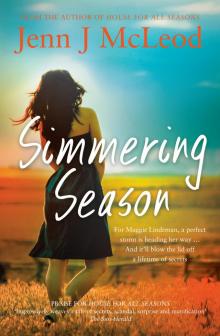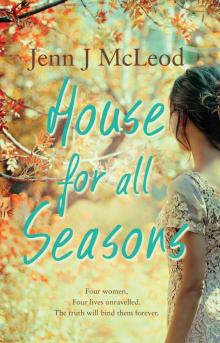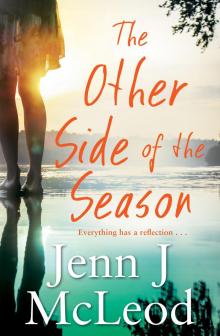- Home
- Jenn J. McLeod
Simmering Season Page 4
Simmering Season Read online
Page 4
‘You know not to ask me to go back there. Aren’t you the girl who’s always saying never go back?’
‘Brian, look at me. Keeping the flat is killing us. The pub’s not selling. Something has to go. The three of us could live so cheaply at the pub, and you’d be great for business. We don’t make enough to afford live entertainment. We have an old pianola and a poorly stocked jukebox that can’t compete with the bands playing at Saddleton Hotel. Bands draw people in. You’d be a bit of a celebrity.’
Brian lurched away, his expression—what she could see of it under the shadow of the Akubra brim—unreadable. Not so the restrained roar, like a low growl, that attracted wary glances from those at adjacent café tables. Maggie remained unperturbed. The husband she knew wasn’t a violent man. Right now he was hurting and frustrated. She sat back, forced a smile, let people see this wasn’t something to worry about.
Brian folded his arms and slid his elbows across the table. He peered up from underneath his brim and whispered, ‘Maggs, asking me to leave here now while there’s still a chance is like asking me to walk away from a pokie after feeding the bastard for two hours. You know that feeling. Remember the night you walked away and that bimbo walked over, put one coin in and—’
‘It’s not the same.’
‘Yes. It is. Can’t you see, Maggs? This will come off for me.’
‘Brian, the show … It is finished, isn’t it?’
‘Next season’s series is going into production soon. Reg, one of the producers, is fantastic. He’s helping me with some industry contacts too. We’ve got a bit of a contra deal going. This business has a lot of you scratch my back stuff.’
Maggie was about to ask more about this Reg character when Brian leaned closer still, his voice lowered. ‘There’s no way I’m giving up and letting some next-season smart-arse move in and take what’s mine. This is the break I’ve been waiting for. I know it’s just a matter of time. I can feel it, Maggs. Besides, I don’t fit into small towns any more. Here I can melt into the crowd.’
Hardly, Maggie thought, trying to ignore the two teenage girls not caring enough to hide their giggles.
‘You say the same thing every time I raise the subject. Noah needs you. He misses his father.’
Brian shook his head and instinctively wrapped a hand over the tattoo that had once been his son’s name, rubbing back and forth over the spot. ‘I can’t. I need to make something of myself and I need my kid to be proud of his old man. What would I tell Noah if I gave it up now?’
‘Tell him the truth. Tell him you tried. He’ll be happy just having his dad in his life again. Let him have his father back.’
‘His father doesn’t exist any more. I feel like I need to earn his love all over again.’ Brian fell quiet. ‘I let him down, Maggs. If only I’d—’
‘Stop it, Brian.’ Maggie was witnessing the first signs of the downward spiral that, if left unchecked, would take her husband to a very dark place. Wanting to grab him and shake sense into him, she instead dug deep for the false optimism she knew could stop the decline. ‘You didn’t fail him,’ she said. ‘You didn’t fail—full stop. You did your best and you did really well. The show might not want you. We do.’
‘My best wasn’t enough. It’s never enough.’
Why did he always make her feel like she had two brooding teenage males to deal with?
‘You’re enough for Noah. He’s growing up, Brian, and you’re missing it.’ I know what that’s like, she wanted to add. ‘He’ll deal with the truth better than the lies.’ Maggie choked a little on the last few words. She needed to remember that herself next time she decided to sugar-coat her answers to Noah’s enquiries about his father’s so-called ‘big-city gig’.
Brian’s twitching, sniffing and fidgets now incorporated his legs doing an anxious jig up and down beneath the table. ‘Am I enough for you, Maggs? Do you still love me?’
She saw the cheeky smile, imagining the sad puppy-dog look in his eyes under the shadow of his hat. He might have been coming back out of the dark, but not enough that the truth wouldn’t plunge him back again. Maggie’s gaze dropped to her lap, her fingers twisting themselves in nervous knots. ‘Yes. I love you,’ she said.
‘Sing it with me then.’ He leaned across and grabbed her hand, pressing her fingers to his lips.
‘No, Brian. I’m not singing. Not here.’
‘Aw, c’mon, Maggs.’ The old Brian switch flicked to ON. ‘Sing our song with me. C’mon. Ready? Don’t tell me you’ve forgotten the words.’
‘I haven’t forgotten them, Brian,’ she said flatly. ‘Just not here.’
He tugged her hand again, pulling her towards him, her body stretched over the top of the small square table, their faces almost touching. ‘Sing it with me. Ready?’ He sang in a whisper, ‘I love my Magpie, just a little-biddy peck … C’mon sing with me. Just a little-biddy peck and a …’
‘… a love bite on my neck.’ She spoke the final lyrics, determined to not let her husband see the smile trying to burst through. The silly song always did the trick and made them both laugh at the end of a fight. They used to laugh so much once.
They said goodbye outside the café as if nothing had changed between them. Had things changed? Brian told her he loved her and Maggie mumbled the words back. Then he kissed her, hugged her and whispered her name three times. ‘Maggie, Maggie, Maggie.’
The train trip from Newtown to St James Station in the city was a crowded one, her carriage painted with graffiti and tainted with a nauseating concoction of suit sweat, sickly scents and sharp aftershave. As the train passed through the stations, the phases of her marriage with Brian flicked through her mind. They’d been married for more than half her life. She’d never since imagined living apart. Brian had been there when she’d needed him after her brother died, when Maggie had accepted Michael’s death as an accident. Her father hadn’t. It was the only time she’d witnessed her father forsake God. The tragedy and its aftermath had torn the town in two, sixteen-year-old Maggie’s heart along with it when they blamed one boy for her brother’s death.
Brian had mended her heart again. He’d been there ever since. Sometimes he was too much, too close, too demanding; more like a fretful five-year-old than a grown man. Once drawn by Brian’s vulnerability and the obsession with music that had been so endearing, Maggie now feared those same weaknesses would be his undoing.
Maggie let go of the memory of that train trip and the sick feeling of saying goodbye with the future so uncertain. At least for the next few hours, on this road trip with Sara, there was nothing to be done, so she drifted off into nothingness.
A sharp swerve and tooting of horns jolted Maggie awake, the dog-eared gossip magazine sliding from her lap to the Subaru’s foot well.
‘Moron!’ Sara shouted at the overtaking road train. ‘Sorry about that. If only he’d waited a few hundred metres. There’s an overtaking lane up ahead.’
‘Best you don’t argue with those big ones.’ Maggie flicked the air vents to interior only, knowing their car would quickly fill with road dust kicked up by the monster semi-trailer whose right-side wheels were sliding over the loose gravel of the far shoulder. She checked her watch, surprised to see four hours had passed. ‘Sara, why didn’t you wake me?’
‘I told you, I’m enjoying the opportunity to drive. We’re like a couple of girls on a road trip.’
‘Maybe not so Thelma and Louise next time you see a road train though, eh?’ Maggie laughed and picked up the magazine from between her feet.
‘Okay, so talk to me. A little conversation wouldn’t hurt. What gives?’ Sara asked, pointing to the magazine. ‘What on earth made you buy that rubbish? I never took you for a gossip-mag junkie.’
‘I didn’t buy it. I pinched it from the hotel room.’
Sara gave a sideways smile. ‘I never took you for a crook, either.’
‘There was a pile of them, twelve months or more old. I figured they wouldn’t miss this one.’ Maggie
shifted her position to relieve the tension in her back, keen to change subjects. ‘The trip home seems longer, don’t you think?’
‘We’ll stop for a bite soon and you can take over the driving.’
Maggie found night driving difficult. Even though they’d left the highway with its glare of oncoming headlights, looking out for straying wildlife on country roads brought a different sort of eyestrain. She slowed down to pass a stationary four wheel drive, two men in its headlights dragging fresh road kill to the side of the road.
‘So sad,’ she said to Sara.
‘Too late for the roo, but taking the time to get it off the road will at least keep scavengers from being hit while they feed on the carcass.’
‘That’s the country!’
‘And that’s the Welcome to Calingarry Crossing sign.’
The lights dotting the darkness on the outskirts of town were like a jab of energy for Maggie. As Sara’s car sped under a corridor of tall eucalypt trees, the glow from an almost full moon flickered like a strobe light. Maggie looked to the left, recognising the dark mass in the distance as a clump of trees where the old mare, past her use-by, would be standing alone. Maggie rarely missed an early morning jog because of that horse. No doubt she’d be taking extra carrots tomorrow morning to make up for her absence.
In the dark, beyond the paddocks, were specks of light—family homesteads filled with the aroma of family dinners and the sounds of contented family chaos. Waiting up the road, beyond two more bends, were the signs of Maggie’s life: the illuminated Tooheys New sign, the smell of beer, and the sounds of a social life Maggie watched from a distance most nights. As publican she lived two lives: the amiable, self-sufficient one in the public bar and the lonely, after-hours one in the residence at the back of the pub.
On the veranda, Jackpot’s unfailing excitement made Maggie smile, his excited yelp causing the predictable chorus of ‘Jackpot!’ from the main bar as the Jack Russell bounded out to her, tail whipping madly.
‘G’day fella.’ Maggie leaned down and ruffled the little dog’s ears. ‘Miss me?’
The attention caused the older dog—a Staffy, still curled up on the beanbag with the pink-heart pattern by the pub’s main entrance—to lift his head, his tail thump, thump, thumping the doggy bed with lazy reliability.
‘Don’t bother getting up, Achilles,’ Maggie chuckled as she headed inside.
From behind the bar, Ethne, the town’s long-time barmaid, nodded understandingly as Maggie signalled from the side entrance that she was heading out to the residence, the small cottage adjoined by a covered colonnade.
Down the hall from Maggie’s room, which by day boasted a splendid view across Rivers Edge Road and the Calingarry Creek, was her son’s. With the room suspiciously quiet, Maggie knocked softly three times and called, ‘Noah, buddy, are you awake?’
‘Sure Mum, I’m studying.’
Studying?
Maggie considered her son’s answer carefully. A seventeen-year-old boy’s room was a scary space for a mother to charge into without due preparation. Noah’s growth spurt this last twelve months had turned his voice deep, his chin spiky and his room into a knock-and-wait-just-in-case kind of place. The cracked ceramic doorknob pressed cold against her fingers as she slowly turned the handle to peer through a small gap, the fug of adolescent male hitting her nostrils.
‘Hey, bud.’
‘Hi.’ Noah’s foot kicked his desk, propelling the wonky office chair across the wooden floorboards until it snagged on the rug with the frayed edges. ‘How was the funeral, Mum?’
Maggie picked up a single sock while scanning the floor for its mate. ‘Sad but okay. Pretty flash. Awkward. Good to be home. Missed you. How’s things been here? What did you get up to?’
Noah shrugged. ‘Nothing much.’
‘Hmm, well, maybe this will make you smile.’ Maggie held out the DVD she’d kept partially concealed. ‘I believe you wanted this one.’
The music DVD was of a group Maggie had never heard of before her son’s recent fervent interest in them, doing a live performance somewhere Maggie had never heard of, supported by an act Maggie had never heard of, but when she’d seen it on a stand outside the little music store she’d found in a Newtown laneway, she had to spend the $25.99. Her son’s beaming face now made it worth every cent.
‘Whoa! Cool! Thanks heaps.’ He was already loading it into his player.
‘Had dinner?’
‘Yeah. Ethne and I ate early. Saved you some.’
‘Thank you, buddy. I think I’m going to hit the hay though.’ The urge to kiss her son goodnight came and went. Noah’s need for such affectionate displays had changed around the same time as his voice.
‘Mum?’ Noah ventured as Maggie was closing the door behind her. ‘Did you see Dad? Is he coming?’
Maggie hoped her face was smiling. ‘No, buddy, he’s not able to yet. He sends his love and … Of course the DVD is from him.’
Not only was the look on her son’s face worth the $25.99, it was now worth the lie.
What dreadful hot weather we have!
It keeps me in a continual state of inelegance.
Jane Austen
6
‘That her?’ Noah asked, scuffing over to Maggie on the pub veranda. He swung an arm over her shoulder with ease. In the last six months her son had shot up to—in the old measure—just on six feet tall, dwarfing Maggie’s very average five-foot-eight.
‘Sure is, bud.’
The young woman behind the wheel of the canary-yellow convertible now parked parallel to the kerb—taking up three nose-to-kerb spaces—seemed much younger without the harsh hairdo, the hat, and the ever-present glass of champagne. After a glance in the rear-view mirror and a quick fluffing of her hair, Fiona slid dark sunglasses onto the top of her head, holding back the frizzy, fiery mane of curls.
‘Here I am,’ she called, smiling and waving.
Indeed! But where was the surly, spoilt brat from the funeral? This girl looked all private school charm and compliance. Except for the parallel park. What had made the difference? Maggie doubted a stern talking to from Phillip would have made any impression on the girl, much less found its way through the veneer of mineral makeup powder and London-look mascara so thick the girl’s gluggy lashes were visible from ten paces. With the same natural Nicole Kidman curls Amber had hated, and the next-to-nothing waistline, Fiona Blair looked remarkably like the woman she’d openly blamed for—what were the words Fiona had blurted the day of the funeral? Oh, yes—ruining her life!
The girl hardly looked ruined in her flowing sensation of a shirt and with legs of a praying mantis poured into designer jeans, not that Maggie knew too much about designer anything. She knew enough to know the things she couldn’t afford and anything starting with the word designer was right up there on the top of her list. Most people around here weren’t into designer anyway. In contrast to the comfy country curves of most Calingarry Crossing locals—one of whom Maggie now considered herself to be—there was very little of Fiona.
‘Nice wheels,’ Noah said to Maggie.
‘If you say so. Hardly practical for the country.’ Obviously it was appropriate to despise your dead mother and still take ownership of her car. ‘Remember what I said, Noah. She’s a city girl and she’s just—’
‘No wuckin’ furries, Mum.’ Noah nudged his mother’s arm playfully.
Maggie nudged him back with a warning squint. ‘Please don’t say that. You know I hate it.’ Her arm twitched, itching to smooth the over-gelled hair, the latest addition to her son’s gradual transformation from uncool, clean-cut kid, to something from a Twilight movie.
Generation Y. Why indeed? Why so much black, and why was it when kids wanted to fit in they did everything they could to make themselves different? How he even tolerated wearing black in these temperatures bemused and bothered Maggie, until she recalled the number of times she’d let vanity keep her warm—just barely—when she was young and night-clubbi
ng in the middle of a Sydney winter, wearing very little of everything in order to achieve maximum impact.
‘Now, what about helping Fiona with her suitcase?’
‘Suitcase-es,’ Noah grumbled. ‘How long’s she planning to stay?’
‘Go. Now,’ Maggie growled, distracted by Fiona applying a dab of lip-gloss and the notion that perhaps all the girl’s fat had gone looking for her lips—and found them.
Noah leapt the two steps, hitched the waistline of his jeans up, and swaggered over to the Saab convertible. How long was she planning to stay? The invitation, which Maggie had been kicking herself over after finding out Fiona intended on accepting, was not meant to be a two-suitcase arrangement. Calingarry Crossing was sweltering, with higher than average temperatures for this time of year. One bag would have been ample for a short stay: a few light tops, shorts, sandals. Although Maggie had initially offered for her to lodge at the pub, she’d thought the girl might have chosen to stay with her grandmother, rather than a stranger. Fiona was five star and Maggie’s pub would be lucky to be awarded one. Then again, Fiona’s grandmother—the one Fiona hadn’t known about until recently—was as much a stranger as Maggie was.
You’ve got a big mouth, Maggie.
She groaned at her son’s body language: the puffing up of a budding chest and the flick of his head that momentarily shifted the one gelled clump of fringe from his eyes. From memory her son’s eyes were a cerulean colour, like his father’s, only it felt like she hadn’t seen them for so long—his or Brian’s.
Ethne came from inside and sidled up to her boss. The brash British barmaid had somehow become sister, aunty, mother and friend, her fleshy, flabby proportions strangely comforting whenever Maggie needed a hug.
‘Awright there, love?’ she asked Maggie. ‘Bit of peacockin’ going on over there, I reckon. Makes you realise how grown up he’s gettin’ now. Not sure which one’s puffin’ up more, though. Sure is a pretty Miss Priss, and a tempting one I’d say.’

 A Place to Remember
A Place to Remember Simmering Season
Simmering Season Season of Shadow and Light
Season of Shadow and Light House for All Seasons
House for All Seasons Other Side of the Season
Other Side of the Season